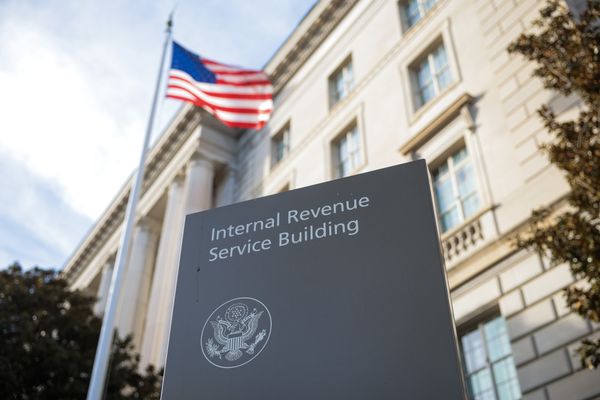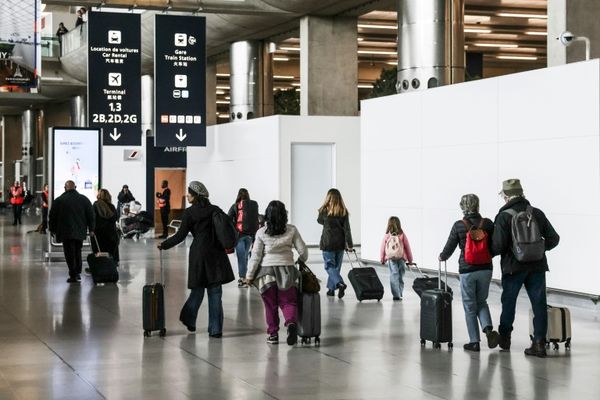By any metric, James Jordan was an exemplary Uber driver. Starting in 2016, he worked 10 hours a day, six days a week. Over the course of 5 1/2 years, he logged 27,000 trips and maintained a rating of 4.95.
He drove so much because he needed the cash. A 55-year-old single father of five in Inglewood, California, there were plenty of expenses, and Uber was his family's source of income. Then, one day in March 2022, that source was abruptly shut off.
He had been driving in the morning when he logged off to pick up his daughter. When he opened his phone to prepare for his next shift, he got the message: He'd been "permanently deactivated" — the gig work industry's euphemism for fired.
"It was a total shock. My gut fell, my emotions were all over the place," Jordan said. "For 5 1/2 years my family relied on the earnings from Uber, to pay rent, pay for my car, all that. To have that taken away when rent is due, and there's no recourse, and there's no type of due process," he said, trailing off. "It's a bad feeling."
Jordan is far from alone in experiencing this particular kind of bad feeling. A new survey of 810 Uber and Lyft drivers in California shows that two-thirds have been deactivated at least once. Of those, 40% of Uber drivers and 24% of Lyft drivers were terminated permanently. A third never got an explanation from the gig app companies.
Drivers of color saw a higher rate of deactivation than white drivers — 69% to 57%, respectively. A vast majority of the drivers (86%) faced economic hardship after getting fired by the app, and 12% lost their homes.
Deactivation hit even the most experienced drivers: The report, conducted by Rideshare Drivers United and the Asian Law Caucus, found that drivers who were deactivated had worked, on average, 4 1/2 years for Uber and four years for Lyft.
Like everything else in the world of gig work, deactivation happens through the app. There's little to no human contact at all, in most cases. No phone or Zoom calls, no text or emails, and certainly no in-person meetings. Most affected drivers said they logged onto the app to start their workday, only to find a notification that they've been deactivated.
"It's cruel, man," Jordan said. "It's almost like Uber sees their drivers like a piece of equipment or a gadget or something, and they can just flip a switch and turn you off."
That tracks. Uber's chief innovation is not its technology, per se, but the story it tells about its technology. Its breakthrough product was pretty rudimentary — GPS plus a smartphone app with a slick user interface — but it felt new enough to let the company present itself as the future of transit. No longer did we call a cab, we summoned an Uber.
This was no dusty old taxi concern. It was a unicorn software company, one that didn't employ cabbies, but rather facilitated the connection of a driver to an independent contractor. This story helped the company elude rules and regulations that governed taxis and black cabs — and pique consumer and investor interest — in cities around the world.
But what makes or breaks Uber is the same as the crustiest old taxi cartel: the drivers making the trips. Uber's core technology is still human labor, and Jordan is right: It treats those humans like equipment. It needs to; that they are invisible, compliant machinery is part of the story. And when that equipment is deemed by Uber to no longer be useful to the company, they are not terminated, laid off or fired — they are deactivated.
For a long time, this semantic nod to Uber's larger narrative about itself helped obscure the ways it wields power over its workforce. It made drivers feel like they had few options when their accounts were locked down.
"When the company gives algorithms the power to deactivate us without even listening to our evidence or testimony, it adds even more precarity to an already precarious job," said Nicole Moore, a driver and the president of Rideshare Drivers United. "Unlike other workers, we don't have the bridge of unemployment insurance to even get us through a deactivation."
Moore relates the experience of a friend and fellow driver, sober for 20 years, who was deactivated because someone reported her as drunk. The police wouldn't breathalyze her because no crime was reported, and she couldn't prove to the company she was sober, and had been for decades. It cost her a week's income.
"The companies act like we are extensions of the app," Moore said, "but we are real people and these firings by algorithm really hurt us as people, and our families who count on the income we bring in."
Jordan thinks it was a combination of factors that got him deactivated: The week he was shut down, three separate riders complained about having to mask in his car, which was Uber's policy at the time. He also turned down a string of requests that would have taken him too far away to make much money. But he still can't be sure.
He appealed the deactivation through Uber's official channels and heard nothing. "It was a formality," he said. "They weren't responding. I was asking for specifics, like just give me the time and date, and let me know what I've done."
Eventually, he took Uber to small claims court, where he could finally plead his case. Only there did he learn that a rider had complained about his using profanity — which he denies — and another had said he'd described a relationship in inappropriate detail. He denies that, too; so vehemently that he begged Uber to let him share his dashcam footage to prove his innocence. (Uber disputes this.)
Ultimately, it was an open-and-shut case; the judge said that while he sympathized with Jordan, it didn't matter, because he'd agreed to submit himself to Uber's whims when he became a driver in the first place. It's in the fine print. Uber reserves the right to deactivate an account if it determines a driver has violated its policies.
"We know that drivers rely on Uber to earn, so the decision to deactivate a driver's account is one that we do not take lightly," an Uber spokesperson said in a statement. "We have a rigorous evaluation process, led by humans, that reviews reports and determines whether temporary or permanent account deactivation is warranted."
The Uber representative also pointed me to the company's website, where it states that a human reviews every case before a deactivation is made. "When possible, we'll let a driver or delivery person know if they're at risk of losing access to their account," the policy states. "However, there are times when we may need to remove access without warning."
There certainly will be cases in which a person who's determined to be dangerous or unfit to drive should have their accounts deactivated immediately, but it's less clear how Uber can justify not informing drivers what the specific allegations or complaints against them are, or refuse to give drivers a fair hearing that is not just "human-led" but with actual humans. But doing so would cost time and resources, and Uber's historically unprofitable enterprise may not be able to bear the load of undertaking such an endeavor as humanely engaging its own vast workforce.
But it's a toxic arrangement that's worse than unfair to the workers. As the report demonstrates, the willfully opaque policy opens the door for discrimination to affect the drivers' livelihoods.
Most ride-hail drivers have encountered discrimination — Jordan, who is Black, recounts being threatened by a rider who called him the N-word — and there's no way to know how Uber responds internally to complaints against drivers who may be motivated by race, gender or sexual orientation. Immigrant drivers are frequent targets of rider bile, and women report high levels of harassment. With the adjudication process sealed behind Uber's doors, it's impossible to say conclusively why it is that drivers of color are deactivated more frequently than white ones — but it's pretty easy to guess.
All across the country, drivers are organizing to push for more transparency and due process over the deactivation process. In New York, Uber drivers went on strike at LaGuardia Airport to call for higher wages and an end to unfair deactivations. In Portland, Ore., they're calling out an advisory board that has long been powerless to help restore improperly deactivated drivers. The city of Chicago is considering an ordinance that would allow deactivated drivers to challenge the gig companies' determination. And proposed legislation in Colorado would force companies to be more transparent about the process.
For its part, the new report calls for just cause and due process in the deactivation process, labor protections afforded employees, and for Uber to address workplace discrimination and sexism. It recommends that just-cause determinations be carried out through an independent, third party; otherwise Uber and Lyft will continue to wield absolute power over their workers.
"They must be held accountable," Moore said, "and we need a deactivation appeals process not controlled by these companies."
I'd add that we should reclaim the language itself, too. This battle is being fought on Uber and Lyft's turf, inside the contours of their own self-produced narratives. But they are not just "deactivating" accounts here — they are firing workers, often seemingly at random, and stripping men and women of their livelihoods.
To those affected, it's so much more harrowing than a "deactivation." It's losing everything to an app. And Uber's not going to change course on its own. Colorado and Chicago are right to move to enact policies that protect drivers; to stop the wanton firing of workers who make ride-hail possible.
"I gave up on trying to get Uber to do the right thing," Jordan said. "I hope this can inspire the courts and the legislators to make Uber do the right thing."







